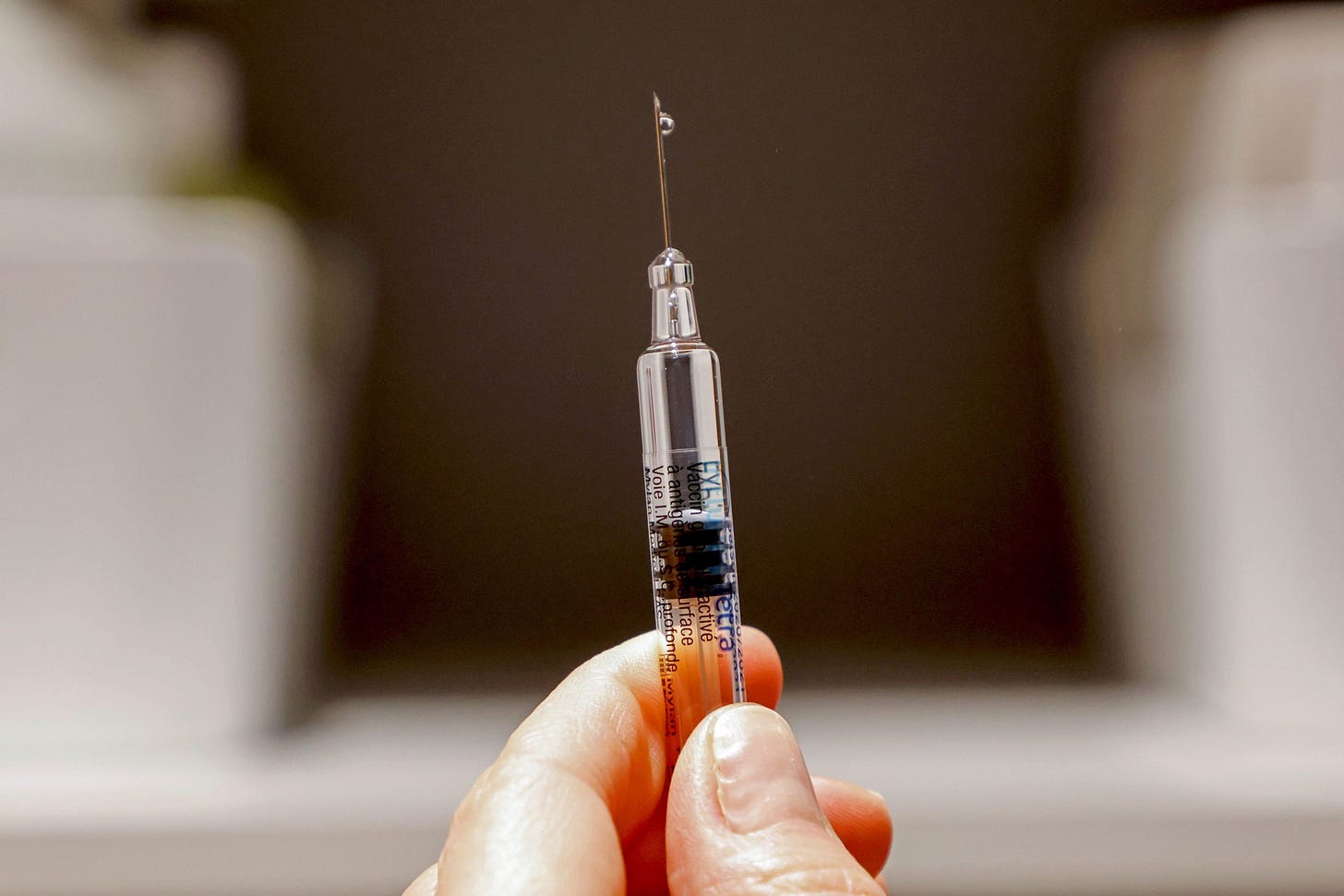Vaccines Don’t Protect People. Vaccination Does.
Implementation. Implementation. Implementation.

On Wednesday, the United Kingdom authorized the Pfizer/BioNTech vaccine for distribution. Here in America, both the Pfizer and the Moderna vaccines have applied to the FDA for Emergency Use Authorization. Help is on the way.
But there is a mantra in medicine: Vaccines don’t protect us from disease—vaccination does. And there are at least four important hurdles that vaccines are likely to encounter in the coming months.
Logistics
The first step is ensuring a medicine is delivered wherever it’s going with its activity intact. This is an important consideration even for pills delivered to neighborhood pharmacies and is particularly important for the two COVID vaccines.
That’s because they both utilize a novel technology which generates immunity not by introducing either a killed or attenuated virus, but rather by introducing a strand of nucleic acid—mRNA—encapsulated by a soap-bubble-like membrane called a “lipid nanoparticle” (see here).
Vaccines delivered in this way are exceptionally fragile and need to be kept extremely cold in order to preserve their activity. In the case of the Pfizer/BioNTech vaccine, the product must travel and be stored under unusually cold conditions: -70°C (-94°F). The Moderna vaccine requires transport and storage “only” at -20°C (-4°F).
Meticulous planning is required to ensure these vaccines are maintained at suitable temperatures until they are just about ready to be deployed.
The requirements for the Pfizer/BioNTech vaccine are a particular challenge since the special freezers are needed which are relatively unusual, especially outside of large hospitals and research centers.
Working out these details has required extensive planning, and it remains to be seen how well these plans will translate into practice.
Dosing
The frequency of dosing can significantly impact a medicine’s effectiveness. A huge advance in HIV treatment, for example, came not from a new biological discovery, but from dramatically simplifying the once-overwhelming treatment regimen. (I wrote about this nearly two decades ago, and the dosing has improved significantly since then, too.)
The remarkable efficacy observed (so far) in the clinical trials with the Moderna and the Pfizer/BioNTech vaccines involved two doses, spaced several weeks apart (21 days for the Pfizer/BioNTech product, 28 days for Moderna’s).
This raises a series of concerns: patients need to come in twice; healthcare providers need a reliable way to keep track of who’s already received a dose, and when, and of which vaccine (the two are not interchangeable).
The repeat dosing may not be a particular challenge for healthcare providers based at a particular hospital, but may be more difficult for professionals who work in a more temporary fashion at any one clinic. Meanwhile long-term care facilities often have relatively high turnover, which could complicate appropriate dosing.
Side Effects
Potentially exacerbating the need for two doses is the observation of side effects already evident from the initial clinical trials. According to recent comments from Moncef Slaoui, who spearheads the Operation Warp Speed initiative, “significantly noticeable” side effects were seen in 10 percent to 15 percent of study volunteers, and include injection site soreness and flu-like symptoms.
Consequently, it’s possible that some who receive the initial dose of a vaccination may be less inclined to receive the subsequent dose, rationalizing that what they already have is better than nothing.
Data reporting how much protection the second dose adds are not yet available.
Trust
A person’s decision to receive a medicine requires a belief that it’s likely to do more good than harm.
Lack of trust in childhood vaccinations—spurred in large measure by fraudulent, subsequently retracted reports that the vaccinations were associated with autism—has resulted in a dispiriting degree of what’s now termed “vaccine hesitancy”observed across the political spectrum. And popular books playing up the idea that vaccines aren’t “natural” haven’t helped. Because of this lack of trust, an estimated 42,000 adults and 300 children die annually in the U.S. from vaccine-preventable illness.
On top of existing anxieties about vaccines we can now layer on the trust issues associated with our current partisan era. Some people who oppose Donald Trump may worry about the safety of a vaccine developed during Trump’s administration. And some who support Donald Trump may be suspicious of a vaccine distributed by a government run by the other party. This is not a fanciful concern. Vaccination-related conspiracies are also common on QAnon and Trump himself was once a vaccine-skeptic.
And those are just the unreasonable concerns. Some concerns may be reasonable. I suspect that most front-line healthcare providers caring for COVID-19 patients will be eager to receive the vaccination. But it wouldn’t surprise me if some physicians, particularly those at lower immediate risk, are likely to worry about the paucity of long-term safety data on the new vaccines.
The pandemic has occasioned a national crash-course in the complexities of medical product development; it seems only fitting that we are now poised to learn about the importance, and the challenge, of translating even the most promising clinical trial data into real world impact.

